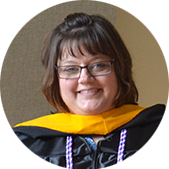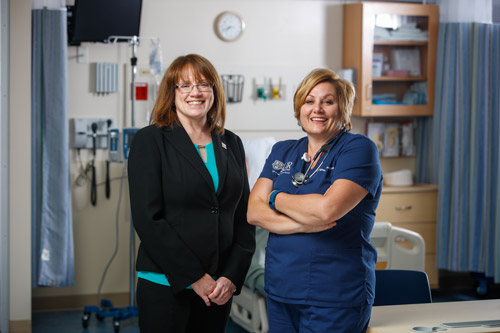
Kellie Murphy, M.S., R.N.
ACLS Program Coordinator & Nurse Educator, University of Rochester Medical Center
The Master's in Nursing Education, designed for bachelors-prepared RNs, is based on nursing science with a focus on advancing clinical and evidence-based teaching skills needed to work in college, university, and clinical settings. Working RNs can complete this degree in 18 months; , coursework is 100% online! 16 hours with a preceptor and 120 hours with a nurse educator are required.
Do you have questions you need answered about the program and the admissions process? Schedule an appointment below or call or text your Adult & Graduate Enrollment Representative, Caleb Choate, call 585.594.6388.
Get More Info by clicking below to request details on our program admissions, curriculum, tuition, and more.
COURSE LENGTH
8-week semesters
PROGRAM DURATION
18-20 months
CLASS SIZE
20 students
PROGRAM CREDITS
39 credits
FORMAT
Online or Hybrid
Join our community of learners and prepare to educate the next generation of nurses and nurses in professional practice by earning your Master of Science in Nursing Education at Roberts Wesleyan University. Pair your passion for education and nursing to prepare practicing and future nurses for excellence in practice. The M.S. in Nursing Education program will prepare nurses with a B.S.N. degree to teach and lead current and future professional nurses as academic educators, clinical nurse educators, and in nursing professional development at colleges, universities, hospitals, or healthcare organizations.
The Master of Science in Nursing program is based on specific competencies and standards defined by professional organizations such as the National League for Nursing, the Association for Nursing Professional Development, and the American Association of Colleges of Nursing.
Those who graduate with an MS in Nursing Education meet the educational requirements to sit for the Certified Nurse Educator exam offered by the National League for Nursing.
PROFESSIONAL NETWORKING Opportunities
WORK ALONGSIDE Field Experts in Clinical and Teaching experiences (136 hours)
EXPERT FACULTY supports students academically, professionally, and personally
EARN YELLOW BELT in Lean Six Sigma for Health Care
Pre-admission tests not required (GMAT, GRE)

Students completing the M.S. in Nursing Education degree at Roberts Wesleyan will have the knowledge and skills to promote excellence in nursing education and practice. In this program, you will learn
Evidence-based strategies to facilitate learning through courses with an emphasis on:
Students will gain mentored experiences in the role of an educator in classroom-based teaching, clinical instruction, and online teaching.
Graduates will possess the knowledge and skill to use the latest evidence and research from nursing and other disciplines to impact changes in nursing practice, and education and improve patient safety, quality of care, and health outcomes.
The accredited MS in Nursing Education program offered by Roberts Wesleyan University is designed for nurses with a Bachelor of Science in Nursing. Nurses with a Bachelor’s degree in another field can earn both a B.S. and M.S. in nursing through the accredited R.N. to M.S. program. The 39-credit curriculum provides each student the foundation that registered nurses need for education roles as faculty in academic or professional settings.
The American Association of Colleges of Nursing (AACN) encourages all nurses to strive for a higher level of education. As a result, the advancement of quality care available to the nursing community will improve. Now is the time for nurses to earn their degrees, invest in their future, and begin the journey into graduate nursing education at Roberts Wesleyan, an accredited University.
The field of Nursing and Nursing Education is growing and in high demand. According to the U.S. Bureau of Labor Statistics, employment for nursing school educators and instructors is projected to increase by 7% through 2029.
The U.S. Bureau of Labor Statistics also projects that roughly 3,318,700 registered nurses are needed by 2029 to meet the replacement needs and job growth from the retiring workforce. Institutions are in need of nursing educators to teach the next generation and continue the education of working registered nurses.
Careers: Professional opportunities abound in a diversity of settings as the demand for nurse educators grows.
Employers
Nursing education professionals have opportunities to participate in evidence-based, quality, and research studies, disseminate their scholarly work through publications and conferences, serve as an education and healthcare consultants, participate in writing proposals for grants, and engage in community service.
Sources cited:
Postsecondary Teachers: Occupational Outlook Handbook. (2020, September 01). Retrieved December 09, 2020, from https://www.bls.gov/ooh/education-training-and-library/postsecondary-teachers.htm
Registered Nurses: Occupational Outlook Handbook. (2020, September 01). Retrieved December 09, 2020, from https://www.bls.gov/ooh/healthcare/registered-nurses.htm

Kellie Murphy, M.S., R.N.
ACLS Program Coordinator & Nurse Educator, University of Rochester Medical Center

Monica Seaman M.S., R.N.
Nurse Educator, Emergency Nursing, University of Rochester Medical Center

Genie Rotundo, M.S., R.N., L.C.C.E., F.A.C.C.E.
Centering Healthcare Institute National Consultant
Nurses with a M.S. in Nursing Education can teach nursing academic settings including LPN programs, Associate Degree programs and Bachelor’s degree programs. You can also teach nursing in the professional setting as an educator in a health care setting.
The purpose of the M.S. Nursing Education program is to advance your clinical expertise and develop knowledge and skill in teaching and learning in nursing
A nursing education program is a 39 credit master’s degree program that prepares students for teaching nursing in the college or university setting as well as in healthcare institutions.
This program can be completed in just 20 months.
Nursing Education students experience teaching in nursing in the last course. Students work with an expert faculty member or Nursing Professional Development specialist to gain experience teaching in the classroom and the clinical setting. .
Most students in the M.S. Nursing Education program complete their studies while working full time. Students should plan to spend 20-25 hours per week in course activities.
This program allows students to focus on one course at a time. Classroom based courses meet once a week for 4 hours from 5-9 p.m. Online courses are completed in the convenience of your home. Most classes are asynchronous, meaning you move through the week’s materials at your own pace when it is convenient for you.
All students complete a proposal for a nurse led, evidence-based change to improve patient outcomes. Students are guided through this process during course work throughout the program and finalize the paper in the graduate project course. Students develop projects to address care in their healthcare setting.